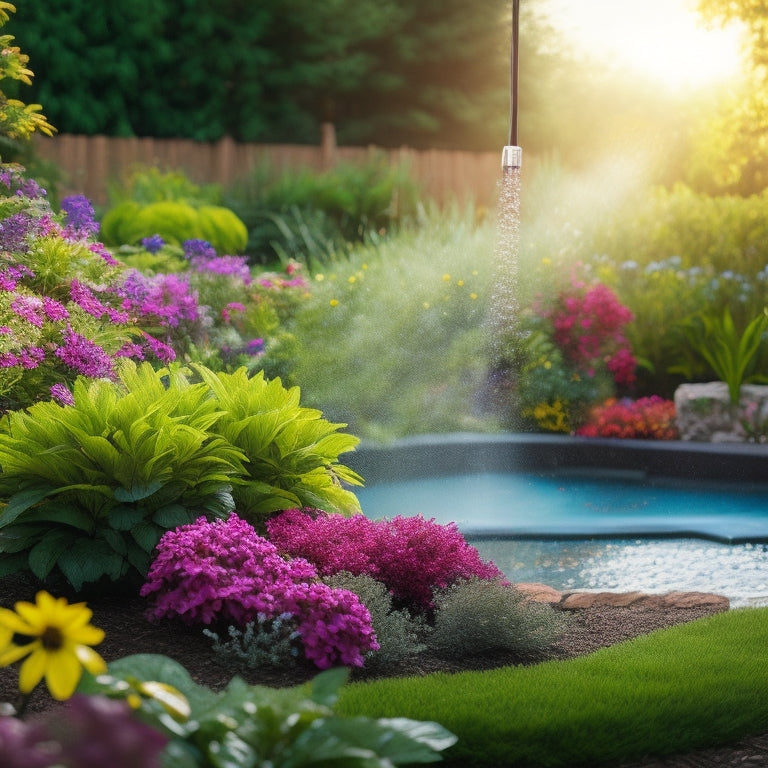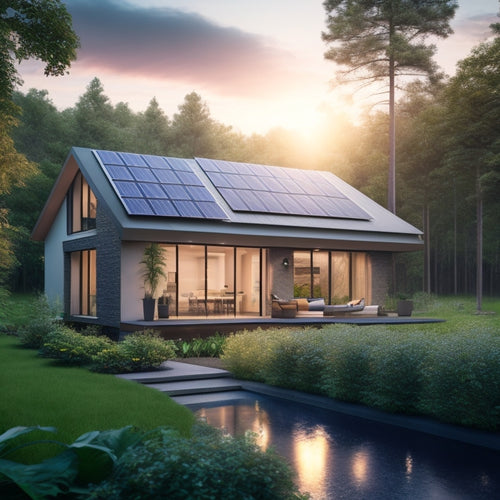
What Irrigation Tech Conserves Water in Your Garden?
Share
You can greatly reduce your garden's water consumption and environmental impact by leveraging advanced irrigation technologies that optimize watering schedules, automate irrigation decisions, and minimize waste. Consider implementing water-saving irrigation controllers, smart sensors for soil moisture, and weather-based irrigation scheduling to guarantee precise plant hydration. Drip irrigation systems, rainwater harvesting systems, and automatic sprinkler system upgrades can also help conserve water. Additionally, evapotranspiration-based irrigation, grey water reuse solutions, and regular system maintenance can further reduce water waste. By exploring these innovative solutions, you'll be well on your way to creating a more sustainable and water-efficient garden.
Key Takeaways
- Water-saving irrigation controllers optimize watering schedules, integrating drip emitters, timers, and moisture sensors for automation and efficiency.
- Smart sensors, like soil moisture sensors, provide real-time data for informed irrigation decisions, minimizing environmental impact.
- Drip irrigation systems deliver water directly to plant roots, minimizing runoff and waste, and achieving up to 50% water savings.
- Rainwater harvesting systems collect and store rainwater for non-potable irrigation uses, reducing potable water consumption and runoff.
- Evapotranspiration-based irrigation utilizes real-time weather data for precise watering needs, maximizing water usage and reducing energy consumption.
Water-Saving Irrigation Controllers
Water-Saving Irrigation Controllers
You're taking the first step towards optimizing your garden's water usage with water-saving irrigation controllers. These devices enable you to fine-tune your watering schedules, ensuring your plants receive the right amount of water at the right time.
By integrating drip emitters, irrigation timers, and moisture sensors, you can automate your watering process, reducing waste and runoff. This precision approach to terrain management enhances garden efficiency, allowing you to enjoy a lush, lively outdoor space while conserving this precious resource.
Implementing energy storage solutions like those used in electric fleets can also help reduce peak demand charges and promote sustainability. Regular irrigation audits will help you identify areas for improvement, ensuring your system operates at peak performance.
Smart Sensors for Soil Moisture
Dig deeper into optimizing your garden's water usage with smart sensors for soil moisture, which take the guesswork out of watering by providing real-time data on your soil's hydration levels.
These sensors enable you to make informed decisions about irrigation, ensuring your plants receive the right amount of water. By adopting sustainable practices, you can minimize environmental impact and contribute to a circular economy.
Furthermore, recycling and proper disposal of hazardous waste, such as old solar panels and batteries, are essential in reducing waste and conserving natural resources.
With smart irrigation, you can:
- Automate watering schedules based on soil moisture levels
- Receive alerts when the soil is too dry or waterlogged
- Monitor soil temperature and salinity levels
- Integrate with smart irrigation controllers for seamless operation
- Reduce water waste and optimize your garden's water usage
Weather-Based Irrigation Scheduling
By fine-tuning your irrigation strategy to account for weather patterns, you can take your water conservation efforts to the next level.
Weather-based irrigation scheduling involves adjusting your watering schedule according to real-time weather data, ensuring you're not overwatering during rainy periods or underwatering during dry spells. This climate adaptation strategy allows for seasonal adjustments, reducing water waste and promoting a healthier garden.
By integrating weather data into your irrigation system, you can optimize water application, reducing the risk of runoff and minimizing the environmental impact of your garden.
Additionally, just as utilizing solar power can provide a clean and renewable energy source for electric vehicles, it's also essential to consider net metering in your garden's energy management.
With weather-based irrigation scheduling, you'll be in control of your water usage, enjoying the freedom to make informed decisions about your garden's hydration.
Drip Irrigation Systems Benefits
You'll find that drip irrigation systems guarantee water savings by providing water directly to the roots of plants, eliminating runoff and minimizing waste.
With targeted water provision, you'll reduce evaporation rates and make certain that your crops receive the exact amount of water they need.
By adopting drip irrigation, you'll experience significant water conservation, making it an attractive solution for water-conscious farmers and gardeners.
Additionally, integrating sustainable energy sources, such as solar-powered fast charging, can further reduce the carbon footprint of your garden, and energy storage systems can maintain a stable power supply, assuring efficient water conservation.
Water Savings Guaranteed
Nearly 70% of the world's freshwater is used for agriculture, making irrigation a vital contributor to water consumption. As a gardener, you have the power to make a change. By implementing drip irrigation systems, you can greatly reduce your water usage, contributing to water conservation and sustainable gardening.
Renewable energy solutions, such as solar panels on fleet vehicles, can also play an essential role in reducing our carbon footprint. Additionally, using biodiesel fuel systems can reduce emissions and are eligible for incentives, cutting costs.
Up to 50% water savings compared to traditional sprinkler systems
- Reduced evaporation and runoff, ensuring the water reaches the roots of your plants
- Increased crop yields due to precise water delivery
- Lower energy costs, as pumps require less power
- Minimal Soil Erosion, preserving your soil's structure and fertility
Targeted Water Delivery
Drip irrigation systems boast a precision that traditional sprinkler systems can't match, supplying water directly to the roots of your plants.
This targeted water distribution guarantees that your plants receive the exact amount of water they need, reducing waste and runoff. With precision watering, you can customize the water application to each plant's specific requirements, considering factors like soil type, climate, and growth stage.
By leveraging fast charging infrastructure and designing systems that optimize energy efficiency, you can minimize energy waste and reduce your carbon footprint.
By supplying water directly to the roots, you're reducing evapotranspiration and allowing your plants to thrive. This targeted application also reduces the risk of overwatering, which can lead to disease and pests.
Reduced Evaporation Rates
Precise water distribution through drip irrigation systems greatly reduces evaporation rates, allowing more water to reach your plants' roots.
This means you can conserve water and reduce your garden's water footprint.
By minimizing evaporation, you can:
- Reduce water losses by up to 50%
- Increase the effectiveness of mulching techniques and soil amendments
- Promote healthy plant growth by supplying water directly to the roots
- Minimize runoff and erosion
- Enjoy significant water savings, giving you more freedom to focus on other aspects of your garden
Rainwater Harvesting Systems
You're likely aware that rainwater harvesting systems can be an important tool in your water conservation efforts.
To get the most out of these systems, you'll need to collect rainwater effectively, store it safely, and use the harvested water efficiently.
Collecting Rainwater Effectively
Rainwater harvesting systems are an essential component of irrigation tech for water conservation, as they enable homeowners and farmers to collect and store rainwater for future non-potable uses.
You can collect rainwater effectively by designing your rain garden to direct rainwater flow towards your harvesting system. Permeable surfaces, such as permeable pavers or gravel, allow rainwater to percolate into the ground, reducing runoff and increasing the amount of water available for collection.
- Direct downspouts to flow into your rainwater harvesting system
- Install permeable surfaces to reduce runoff and increase collection
- Use a first flush device to divert initial roof runoff, which may contain debris
- Position your rainwater harvesting system in a location that minimizes evaporation
- Regularly inspect and maintain your system to guarantee peak performance
Storing Rainwater Safely
After collecting rainwater effectively, it's vital to store it safely to maintain its quality and prevent contamination.
You'll need a suitable storage system, such as a rain barrel or tank, designed for rooftop collection. Confirm your system incorporates filtration systems to remove debris and sediment.
Regular tank maintenance is important to prevent algae growth and maintain water quality. Implement overflow management strategies to prevent waterlogging and erosion.
Check local legal regulations regarding storage capacity and seasonal usage. Consider your garden's specific needs and adjust your storage system accordingly.
Using Harvested Water
Since you've successfully stored rainwater, it's time to apply this precious resource efficiently.
You've taken the first step towards sustainable gardening by investing in rain barrel systems. Now, it's crucial to make use of this harvested water wisely to minimize your water bill and reduce your environmental footprint.
Here are some ways to make use of your stored rainwater:
- Water your plants and lawn during dry spells or when rainfall is scarce.
- Use it for washing cars, sidewalks, and outdoor furniture.
- Irrigate your garden beds, flower pots, and hanging baskets.
- Flush toilets and run washing machines with harvested water.
- Replenish your birdbaths, ponds, or other outdoor water features.
Automatic Sprinkler System Upgrades
Upgrading your automatic sprinkler system can considerably reduce water waste and optimize irrigation efficiency.
By installing rain sensors and soil moisture meters, you'll guarantee your lawn only receives the right amount of water. These upgrades allow your system to automatically adjust to weather conditions, reducing unnecessary watering.
Regular irrigation system maintenance is also essential to prevent leaks and clogs that can lead to water waste.
Consider replacing old sprinkler heads with more efficient models that produce larger water droplets, reducing evaporation and runoff.
Evapotranspiration-Based Irrigation
Evapotranspiration-based irrigation systems employ real-time weather data and soil moisture levels to calculate the exact amount of water your plants need. This technology guarantees you're not over- or under-watering, which can harm plant health.
With evapotranspiration-based irrigation, you'll conserve water and reduce your environmental footprint.
Here are some benefits you can expect:
- Maximized water usage: Water is applied only when needed, reducing waste and runoff.
- Improved plant health: Plants receive the exact amount of water required, promoting healthy growth and development.
- Reduced energy consumption: By using real-time data, you'll minimize energy waste associated with unnecessary watering.
- Enhanced soil moisture management: The system takes into account soil moisture levels, assuring your soil is consistently at the ideal level.
- Increased crop yields: With precise watering, you'll see improved crop quality and increased yields.
Grey Water Reuse Solutions
As you optimize your irrigation systems with evapotranspiration-based technology, it's equally important to contemplate another notable water conservation strategy: grey water reuse solutions. Grey water is wastewater generated from sinks, showers, and washing machines, which can be reused for irrigation purposes after proper treatment. Implementing grey water reuse solutions in your garden can appreciably reduce your potable water consumption.
| Grey Water Source | Treatment Required | Irrigation Use |
| Sink water | Basic filtration | Lawn and ornamental plants |
| Shower water | Advanced filtration | Vegetable garden and fruit trees |
| Washing machine water | Basic filtration | Lawn and ornamental plants |
| Dishwasher water | Advanced filtration | Vegetable garden and fruit trees |
| Bath water | Advanced filtration | Lawn and ornamental plants |
Frequently Asked Questions
Can I Use a Drip Irrigation System for Lawns?
You can definitely use a drip irrigation system for lawns, leveraging drip advantages like targeted water delivery to enhance lawn efficiency, but it's crucial to choose the right emitter spacing and flow rates to guarantee uniform coverage.
Do Smart Sensors Work With All Types of Soil?
As you steer through the world of water-wise gardening, you'll find that smart sensors can be finicky, but most models are designed to work with various soil types, accurately measuring soil moisture levels, ensuring you're not drowning your plants in unnecessary water.
How Often Should I Upgrade My Irrigation Controller?
You should upgrade your irrigation controller every 5-7 years to guarantee maximum irrigation efficiency, as newer models often feature advanced water-saving features and improved precision, allowing you to conserve resources and enjoy greater freedom in your garden.
Can I Reuse Water From My Kitchen Sink?
Like a wise farmer harvesting every drop, you're wondering if kitchen sink water can be reused. Yes, you can utilize greywater through sink recycling, but guarantee proper treatment and separation to avoid contamination, enjoying the freedom of a water-conscious lifestyle.
Will Rainwater Harvesting Systems Attract Mosquitoes?
You'll be relieved to know that, when installed correctly, rainwater harvesting systems don't typically attract mosquitoes, as the water's not stagnant; however, you must guarantee proper maintenance to prevent mosquito breeding and maintain good water quality.
Related Posts
-

3 Best Eco-Grants for Home Energy Upgrades
You're eligible for various eco-grants that can help you cut down on energy bills and reduce your carbon footprint by...
-

7 Best Automated Sprinklers for Water-Wise Green Homes
You're likely among the 75% of U.S. homeowners who use in-ground sprinkler systems, and coincidentally, you're also c...
-

3 Earth-Loving Furniture Tips for Energy-Smart Homes
When furnishing your energy-smart home, you have the power to reduce your carbon footprint greatly by making consciou...


